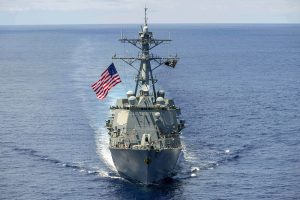On Oct 27, the USS Lassen, a guided-missile destroyer, intruded within 12 nautical miles of Zhubi [Subi] Reef in China’s Nansha [Spratly] Islands in the name of conducting freedom-of-navigation operations. On November 3, Admiral Harry B Harris Jr., commander of the U.S. Pacific Command, said that the operations were not designed as a military threat, but aimed to protect the rights, freedoms, and lawful uses of the sea and airspace guaranteed to all nations under international law. And according to Harris and U.S. Defense Secretary Ashton Carter, the U.S. conducted the naval operation in the Nansha Islands because China’s sovereignty claims were not legitimate and China’s activities compromised freedom of navigation in the South China Sea.
The truth is, however, these two accusations are both unfounded and inconsistent with the long-standing U.S. policy on the South China Sea issue. On the one hand, the U.S. declares that it holds no position on the sovereignty issue in the South China Sea, but on the other, it openly challenges China’s sovereignty claims in the area. The mismatch of its words and deeds is a violation of the principle of estoppel in international law. The U.S. accuses China of endangering freedom of navigation in the South China Sea, but instead of providing evidence to prove its point, it only keeps clamoring that China’s island and reef construction in Nansha is “too quick, too much.”
The Lassen’s operations in Nansha constitute a grave violation of many principles of international law and norms that the United States has supported over the years, mainly in the following three aspects.
First, the U.S. act was an abuse of the rules on freedom of navigation. The U.S. intrusion within 12 nautical miles of China’s Nansha Islands was a typical act of “hazardous passage.” To avoid escalation of conflicts, China has remained restrained on the South China Sea disputes, refraining from publishing the base points and baselines of territorial sea of the Nansha Islands. But China is entitled to its territorial sovereignty and maritime rights and interests, whether the base points and baselines are published or not. Even if we endorse the U.S. claim that Zhubi Reef, as a low-tide elevation, does not enjoy the right of 12-nautical-mile territorial limits, Zhongye [Thitu] Island near Zhubi obviously does, and that island is also part of China’s territory.
The United States repeatedly drew an analogy between the U.S. intrusion in the waters close to the Nansha Islands and a Chinese naval vessel’s passage within 12 nautical miles of the Aleutian Islands in September, claiming that its activity was “innocent passage.” The fact is, under international law, the Tanaga Pass of the Aleutian Islands is open to international navigation, so “transit passage” rather than “innocent passage” applied to the Chinese warship. The 12 nautical miles of the Nansha Islands, on the other hand, are not part of international pathways. Why did the U.S. vessel choose to take this detour when the international waterway was wide enough for its passage? The U.S. act was obviously an abuse of the rules on freedom of navigation under international law.
Second, the U.S. show of force was a breach of its international obligations concerning no use or threat of force. Due to the complicated hydrological regime around the Nansha Islands and diversity of the naval strengths of different countries, China has all along been tolerant to vessels that mistakenly entered waters close to the Nansha Islands. The United States itself also recognizes that it once entered within 12 nautical miles of the Nansha Islands before 2012. But this time, the United States identified a 12-nautical-mile line before declaring its challenge. Its action was intended to negate China’s territorial sovereignty and maritime rights and interests over the islands and reefs in the area, and no doubt posed a blatant military threat to China.
It is natural that China and the United States have disputes when it comes to the rules of maritime navigation, but the differences should be resolved through negotiations and consultations. This is the normal international practice for dispute settlement. The U.S. use of force apparently ran counter to the principle of resolving international disputes by peaceful means and its obligations under international treaties, and constituted a gross infringement of the purposes and principles of the United Nations Charter and other international rules and norms.
Third, the U.S. act violated China’s territorial sovereignty and eroded the basic principles of international law. Sovereign states are main players in today’s international system, and respect for sovereignty is the basic principle of international law. Previously, the United States had repeatedly emphasized that it held no position on the sovereignty of the Nansha islands and reefs. But this time, by conducting the so-called freedom-of-navigation operations, the United States intended to negate China’s sovereignty and maritime interests over its long-garrisoned islands and reefs where extension projects were carried out recently. This was a direct provocation against China’s sovereignty. If countries were allowed to willfully challenge the sovereignty claims of other countries, wouldn’t the entire international system be pushed to the verge of collapse? The U.S. act was not only a violation of the principle of estoppel in international law, but also a grave challenge to the sovereignty principle of the international system.
In a nutshell, the United STATES was actually engaged in hegemony and power politics, a prevailing pursuit in the world in the 19th century, under the cloak of the 21st century endeavor of safeguarding freedom of navigation and international justice. This is sheer hypocrisy. The United States might as well make clear its real intention to the world that it does not want to see any increase of Chinese power in the South China Sea.
Hu Bo is a Research Fellow at the Institute of Ocean Research of Peking University.
This article was originally published at China U.S. Focus.

































